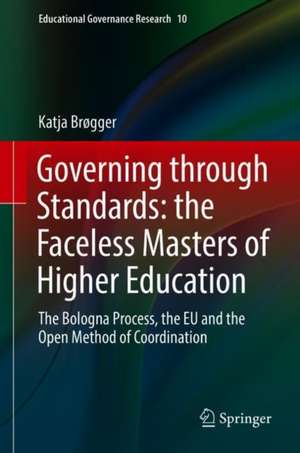Governing through Standards: the Faceless Masters of Higher Education: The Bologna Process, the EU and the Open Method of Coordination: Educational Governance Research, cartea 10
Autor Katja Brøggeren Limba Engleză Hardback – 20 noi 2018
Din seria Educational Governance Research
- 24%
 Preț: 680.66 lei
Preț: 680.66 lei - 20%
 Preț: 553.85 lei
Preț: 553.85 lei -
 Preț: 304.59 lei
Preț: 304.59 lei - 18%
 Preț: 941.05 lei
Preț: 941.05 lei - 24%
 Preț: 749.04 lei
Preț: 749.04 lei -
 Preț: 305.98 lei
Preț: 305.98 lei - 18%
 Preț: 732.70 lei
Preț: 732.70 lei - 18%
 Preț: 892.90 lei
Preț: 892.90 lei - 15%
 Preț: 641.38 lei
Preț: 641.38 lei - 18%
 Preț: 947.85 lei
Preț: 947.85 lei -
 Preț: 379.48 lei
Preț: 379.48 lei - 18%
 Preț: 1006.24 lei
Preț: 1006.24 lei - 18%
 Preț: 785.86 lei
Preț: 785.86 lei - 24%
 Preț: 832.93 lei
Preț: 832.93 lei - 24%
 Preț: 682.78 lei
Preț: 682.78 lei - 15%
 Preț: 637.59 lei
Preț: 637.59 lei - 15%
 Preț: 649.54 lei
Preț: 649.54 lei -
 Preț: 392.97 lei
Preț: 392.97 lei -
 Preț: 388.52 lei
Preț: 388.52 lei -
 Preț: 440.39 lei
Preț: 440.39 lei - 15%
 Preț: 700.94 lei
Preț: 700.94 lei - 15%
 Preț: 703.06 lei
Preț: 703.06 lei - 15%
 Preț: 587.53 lei
Preț: 587.53 lei
Preț: 389.88 lei
Nou
Puncte Express: 585
Preț estimativ în valută:
74.61€ • 78.25$ • 62.11£
74.61€ • 78.25$ • 62.11£
Carte tipărită la comandă
Livrare economică 01-15 aprilie
Preluare comenzi: 021 569.72.76
Specificații
ISBN-13: 9783030008857
ISBN-10: 3030008851
Pagini: 199
Ilustrații: XIII, 185 p. 14 illus., 13 illus. in color.
Dimensiuni: 155 x 235 mm
Greutate: 0.46 kg
Ediția:1st ed. 2019
Editura: Springer International Publishing
Colecția Springer
Seria Educational Governance Research
Locul publicării:Cham, Switzerland
ISBN-10: 3030008851
Pagini: 199
Ilustrații: XIII, 185 p. 14 illus., 13 illus. in color.
Dimensiuni: 155 x 235 mm
Greutate: 0.46 kg
Ediția:1st ed. 2019
Editura: Springer International Publishing
Colecția Springer
Seria Educational Governance Research
Locul publicării:Cham, Switzerland
Cuprins
1. Introduction: It changes everything.- 2. Analyzing education reforms.- 3. The Bologna Process: From hard government to soft governance.- 4. Standardizing Europe: Standards as a mode of governance.- 5. The infrastructure of the Bologna Process: Standards as technology.- 6. The alteration of higher education: The performativity of standards.- 7. Concluding remarks: “Who marks the bench?”.
Textul de pe ultima copertă
This book offers an empirical and theoretical account of the mode of governance that characterizes the Bologna Process. In addition, it shows how the reform materializes and is translated in everyday working life among professors and managers in higher education. It examines the so-called Open Method of Coordination as a powerful actor that uses “soft governance” to advance transnational standards in higher education. The book shows how these standards no longer serve as tools for what were once human organizational, national or international, regulators. Instead, the standards have become regulators themselves – the faceless masters of higher education. By exploring this, the book reveals the close connections between the Bologna Process and the EU regarding regulative and monitoring techniques such as standardizations and comparisons, which are carried out through the Open Method of Coordination. It suggests that the Bologna Process works as a subtle means to circumvent the EU’s subsidiarity principle, making it possible to accomplish a European governance of higher education despite the fact that education falls outside EU’s legislative reach. The book’s research interest in translation processes, agency and power relations among policy actors positions it in studies on policy transfer, policy borrowing and globalization. However, different from conventional approaches, this study draws on additional interpretive frameworks such as new materialism.
Caracteristici
Exposes the mode of governance that characterizes The Open Method of Coordination and documents the close relations between the Bologna Process and the EU Shows how the policy ambitions in the Bologna Process, the EU and national political rhetoric fail to resonate with the practices of everyday working life in higher education Draws on non-conventional interpretive frameworks such as new materialism
